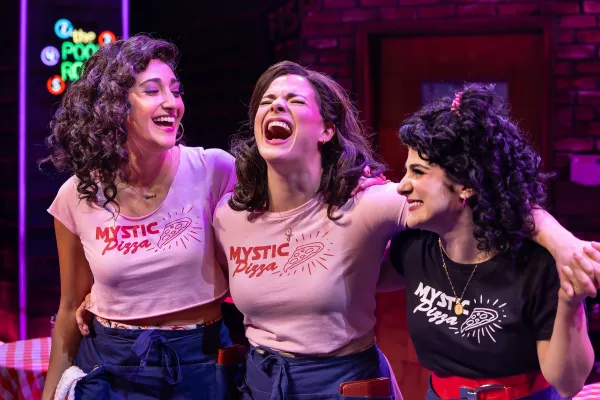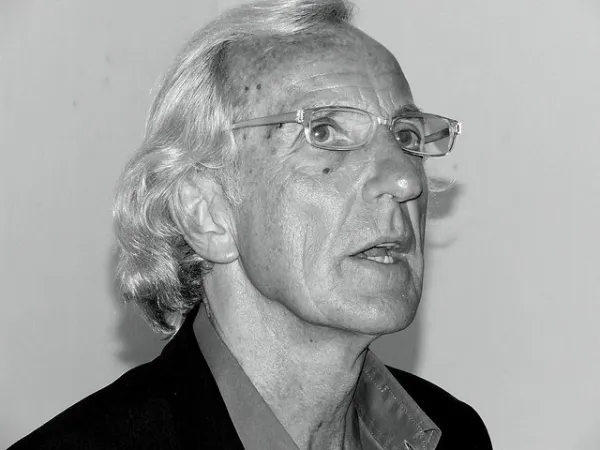MYSTIC PIZZA: THEATRE REVIEW

Mystic Pizza is a thoroughly enjoyable, consummately unoriginal musical play, from top to bottom. This retread of the 1988 movie is essentially a coming of age story about three young women in the eponymous Mystic, a seaside town in Connecticut. The trio – Daisy Arujo (Krystina Alabado), her sister Kat (Kyra Kennedy) and their friend Jojo Barboza (Gianna Yanelli) – are searching for romance and their pathways in life, yearning for a more fulfilling life than mere housewifery and drudgery in proletarian Mystic. This timeworn plot is, however, set in a fairly novel social milieu, namely a community with many residents of Portuguese descent, a minority group that doesn’t get much attention in U.S. pop culture.
Trump-N-Boots

Lies to cover-up genocide, a Path to Peace

Recording of a webinar hosted by War Industry Resisters and MA Peace action
among others on 18 January 2024 (257 attendees). Prof Mazin Qumsiyeh
addressed the subject of this era: The Israeli genocide continues and so
does Palestinian resistance in all its forms. Huge demonstrations around
the world that call for Palestinian freedom while Western corporate media
conveys an Israeli narrative that portrays the mass murder and injury of
tens of thousands of Palestinians as justified rather than as criminal.
https://www.youtube.com/live/UHUgFIEWr1g
Qumsiyeh and Haidee Clauer. 2023 Weaponizing Israeli National Parks to
ethnically cleanse Palestinians. Palestine Israel Journal. Vol 3/4
Cowards In Blue

Syphilis Trump

DAS RHEINGOLD: Opera Review

LA Phil and its Music & Art Director, Gustavo Dudamel, are taking Richard Wagner’s Das Rheingold out of the opera house and into the concert hall to present Das Rheingold, the first of the ambitious librettist/composer’s mammoth, marathon 17-hour, musical/ theatrical, four-opera extravaganza known as The Ring Cycle or Der Ring des Nibelungen. Das Rheingold – which refers to the gold of the Rhine River, not to the official beer of the N.Y. Mets – is set in primeval Germany, its characters and story derived from Northern European mythology.
Wagner’s magisterial, majestic, moody music is perfect for evoking these mythic gods, giants, dwarves, trolls, nymphs, Valkyries and other figures, plus tales, from lore that existed centuries before Christianity spread to Europe and Wagner wrought his “Bühnenfestspiel” (stage festival play) about the epic quest and struggle for a magical golden ring that endows its bearer with omnipotent powers.
John Pilger, a Friend of Palestine and All Oppressed Nations, Has Passed Away

The first and the last time I met John Pilger in person was in 2018.
I was invited to deliver a speech at the NSW Parliament in Sydney, Australia. Among the large crowd were many that I knew and respected - a former foreign minister, socially conscientious MPs, morally driven intellectuals and activists, and so on.
As I stood at the podium, glancing at the crowd, I saw John Pilger. He had a big smile on his face, as if he was in great anticipation to hear me talk.
The reality was entirely different. I would have rather listened to John than to lecture before him.
As I expressed my many “thank yous”, I made a point of emphasizing that I have modeled my journalism around that of John Pilger.
Die For Donny

AN EXTRAORDINARY ORDINARY MAN: Theater Review

John Colella’s An Extraordinary Ordinary Man is a paean to the writer/actor’s dad and his
Italian-American clan. In his autobiographical one-man show Colella lovingly, vividly brings his
family alive onstage, regaling the audience with vignettes from his youth, growing up amidst the
family business in Chicago. Claudio Pastry was established by Colella’s immigrant grandfather,
who arrived penniless from the Mother Country and created an enduring, thriving business that
was passed down to the playwright’s father.
The bakery became the center of the family’s existence. When John was a child, he relished
learning all of the tricks of the baker’s trade, as well as devouring delicious desserts baked right
on the premises. In the play, indulging in paisano pastries such as cannolis and eclairs, little John
amusingly muses that it was as if he had his own private, personal “Willy Wonka.” He also
idolized his dad, a baker so skillful that to his son, his pop was a three-star-plus Michelin chef,
imbued with mystical flour power.
However, to his son’s surprise, John Sr. would repeatedly counsel his lad to “be anything but a

